

Volume II / Issue 16 / August 2017

From the Editorial Desk:

This month has been a very special month of firsts for me.
I was ordained Deacon and I also did my first Deacon Mass. I was in awe as I held the Eucharist between my fingers. The whole Deacon mass was a very humbling experience.
For my editorial, I thought I would post a open letter to me by a Priest that has been a good friend. The letter meant so much to me:
Open Letter to Brother Francis Dominic
[NOTE: Brother Francis Dominic is scheduled to be ordained as a deacon on Tuesday, August 1st, 2017]
Dear Brother Francis Dominic:
I address this letter to you and it is meant for you but, really, it is meant for all of us . . . . . including myself. All of us can learn important lessons in life by reflecting on the lives of others around us. You will soon be ordained, God willing, as a deacon. I know this is a busy time in your life with the preparations and getting things ready. But come to think of it, when is it not a "busy time" when you are a minister of God's Word? Reflecting on your upcoming ordination has caused me to think about my own ordination as a deacon twenty-five years ago. Wow! A quarter of a century seems like such a long time . . . . and it is . . . but on the other hand, it seemed like only yesterday that I, too, was ordained as a deacon. I remember being on edge the days and weeks leading up to my ordination, wondering if I was truly called . .. . wondering if I had what it took to be a deacon . . . . wondering . . . . wondering . . . . wondering. When I was ordained as a deacon I had spent some eight years in the seminary at that point. This was eight years of studying, preparing, praying, pondering, working, worrying, sweating, enjoying, etc, etc, etc. In other words, it was eight years of keeping busy . . . eight years of being occupied . . . eight years of focusing on what I needed to do \right then and there, at that moment. Preparing for tests; writing papers; being in the chapel; going to the Dining Hall; studying for finals; doing my chores at the seminary; going to do my seminarian work at various hospitals, schools and other ministries. In other words, it was a BUSY eight years. Come to think of it, most all of us are busy, aren't we? Most everyone leads busy lives moving from one "chore" to the next: going to work; paying bills; taking care of the house; cleaning; doing laundry; running errands; etc., etc., etc. But sometimes it is good just to step back and look at the "big picture," if you will. Because as I described above, life very often gets bogged down in the "little things" such as running errands or cleaning up messes, going from one project to the next project to the next project, . . . . Sometimes we get so busy running from this errand to that errand, we miss the "big picture" of why we do what we do, of who we really are, who we are called to be, quite frankly.
The "Big Picture" is this: Ministers . . . . whether they be priests, deacons, or bishops . . . . are called to do the work of the Lord here on earth. Ministers are called to emulate Our Blessed Saviour and the work He did here on earth. Our Blessed Saviour did His work of founding the Church and when He did, He called others to assist Him in this function. "And He gave some, apostles; and some, prophets; and some, evangelists; and some, pastors and teachers; For the perfecting of the saints, for the work of the ministry, for the edifying of the body of Christ." (Ephesians 4:11-12) Our Blessed Saviour has called us to do the work of the Lord but, in essence, he has graced us with the awesome responsibility of doing His work here on earth. Our Lord is so awesome, so powerful, that He could have done everything Himself. And yet He called upon average men such as St Peter, and St Andrew, and all of the apostles. Our Lord did not call on the rich and mighty and powerful to be the Apostles. He called on the lowly and humble. He called average fisherman and workers and those who had no formal education, to speak of. He called them to assist Him in His wonderful work. He called them to follow Him and do His work among God's people. " . . . . as the Father hath sent Me, even so send I you." (St. John 20:21) We should always keep this in mind that we are indeed "sent." Our Blessed Lord has sent us and we are merely following the call. Please always focus on the fact that you are following the call. Remember, we in the Church, ordained or laymen, are following the call. We are saying yes to be sent forth out into the world. But always remember that Our Blessed Lord never asked us to be perfect. Whether we like it or not, a deacon, a priest, and even a bishop are human before anything else and humans sometimes make mistakes. Our Lord took this into account when He called the Apostles. Our Lord knew very well that His ministers would make mistakes and yet He chose them anyway. Look at St. Peter.
Sometimes, even in our ministry, we will make mistakes, but the point is to always remember that we are not called to be "perfect" but, rather, to do the work of the Lord here on earth as best we can.
The second thing to remember, in my humble opinion, is that we are called to be "servants," first and foremost. In this fashion, we best emulate Our Blessed Saviour and the work He has called us to do. "For he that is called in the Lord, being a servant, is the Lord's freeman: likewise also he that is called, being free, is Christ's servant." (I Corinthians 7:22) Our Lord gave us an example to follow in that he came to serve humanity. He came to be a Servant. He came to have compassion on those He came in contact with. He came to heal and teach and preach and tell the world about the Kingdom of God. Likewise, we too are called to serve those around us by living the life of a servant. We are called to serve those around us in whatever fashion God calls us to serve. Remember that any "power" we have, we only have it because it was first given to us by God. If God wants us to do something, it will be done. Make no mistake about it. We have to do our part, yes. We have to be open to doing God's will. So often we do not understand why God would call us to begin with. Why would God call me to be His representative? Why would He choose me? Why? Our Lady certainly did not understand why she was chosen either. And yet despite her lack of understanding to why she was chosen, she still gave her "fiat." She still said "Yes" to doing the will of God. So, too, should we give our "fiat" to God in our being called by Him. We may not always understand why He called us. We may not understand how we will do what we are called to do at times. But as long as we say "Yes," we know that God will be with us.
The bottom line is this: being called to the diaconate is an awesome responsibility, yes, but it is also a wonderful gift.
The God that created the universe has called you to assist Him in the work of the Church here on earth. Always be open to doing His will . . . always remember that you are a servant, first and foremost . . . . and always remember that you are God's representative that He has chosen . . . chosen by Him to do His work on earth. And always remember that you said "Yes" to that call. Let each and every one of us say "Yes" to God. If only the whole world would give its' collective "fiat" to God. To say "Yes" not only with our mouth, but to say "Yes" with our life. To say "Yes" to God in everything that we do. To place ourselves in God's hand . . . to place our lives in His service. To keep God first and foremost in our hearts. "As for me, behold, I am in your hand: do with me as seemeth good and meet unto you." (Jeremiah 26:14)
God bless you on your diaconate. God bless you in your service to God and His Church. God bless you and God bless all of us and we grow in the love of Christ and give our "fiat" to Our Heavenly Father by the lives that we lead.

The Holy Name of Jesus

One of the traditions that Anglo-Catholics and many other Catholics still hold dear is that they bow their heads when they hear the Holy Name of Jesus spoken aloud. Up until fifty or sixty years ago, this beautiful tradition was still practiced by Christians throughout the world. Sadly, over time this tradition of showing reverence at the Name of Jesus has decreased in usage.
On the other hand, ironically, usage of Our Lord’s Name seems to have increased . . . but sadly not in a reverent fashion. On a daily basis, whether it be in the workplace or out in public at a store . . . or on television or in movies, you hear people using the Lord’s Name frequently. You hear people saying “Jesus” or “Jesus Christ” or sadly even “God d**n.” Even on the Internet you see the initials written “OMG” on a frequent basis. And, sadly, you even hear some young people write (or say, for that matter) the letter “F” before “G” (as in “OM*G),” which is most certainly blasphemous to say the least.
If you are in church, you would certainly expect to hear Our Lord’s Name mentioned. If you ever attend a Revival, you would expect to hear Our Blessed Lord’s Name spoken aloud or even sang in beautiful hymns. Certainly, in times of prayer, it is a good thing to call Our Lord by His Name. And, finally, in reading Holy Scripture, you expect to hear God’s Name being mentioned. But in any other instance where you hear Our Lord’s Name mentioned in a “secular” setting, this shows complete and utter disregard for the Sacredness of God’s Holy Name.
Even God Himself acknowledges the sacredness of His Name when He gave Moses the Ten Commandments: “Thou shalt not take the Name of the Lord Thy God in vain; for the Lord will not hold him guiltless that taketh His Name in vain.” (Exodus 20:7) And we hear elsewhere: “ . . . neither shalt thou profane the Name of Thy God: I am the Lord.” (Leviticus 18:21) Back then the Name of the Lord was certainly acknowledged as something holy and sacred. In fact, we hear the following from the Book of Leviticus: “And he that blasphemeth the Name of the Lord, he shall surely be put to death . . . .” (Leviticus 24:16) Now, surely we are not recommending that anyone that blasphemes be put to death but this verse certainly points out that in the past, people made a point to not take the Lord’s Name lightly and did not take the Name of the Lord in vain.
We need to be reminded and taught that the Name of the Lord is precious and holy. In showing respect and reverence for the Name of God, we surely show the respect and reverence which we have for God Himself. In acknowledging the holiness of His Name, we acknowledge the holiness of the Good Lord Himself. If the Name of God is not held in esteem, then the question becomes do we even hold God in esteem? Even in the “Our Father,” keep in mind that we pray “. . . Hallowed be Thy Name . . .” Do we keep God’s Name holy if we use that Name as a curse or use it in an “ordinary” fashion. There is nothing ordinary about our God. God is extraordinary. He is holy. He is sacred. He is the Alpha and the Omega. He is the Great “I Am.” God is indeed Our Heavenly Father. When we remember all these things, it puts into perspective that we should not take the Name of Our Heavenly Father lightly. “Neither is there salvation in any other: for there is none other name under Heaven given among men, whereby we must be saved.” (Acts 4:12)
Let us always show honour, respect and love for the Holy Name of Jesus. Let us never take this Name lightly. Neither let us use this Name lightly. Let us teach our children not only by our words but also by our example that we do not blaspheme God’s Name and do not take His Name in vain. In showing respect for God’s Name, we show the respect and regard we hold for God. “That at the Name of Jesus every knee should bow, of things in Heaven, and things in earth, and things under the earth.” (Philippians 2:10)

The Funny Pharmacy
Proverbs 17:22
A joyful mind maketh age flourishing: a sorrowful spirit drieth up the bones.







What are these other Groups, Sedevacantists and SSPX and so on?

The Feast of the Transfiguration of our Lord

Dear soul, in this month of August the Church celebrates the Feast of the Transfiguration of our Lord. The Transfiguration upon Mount Thabor can provides a profound well from which to draw nearly endless fruit of contemplation. But, dear soul, today I want you to focus upon only one small thing that takes place during this great manifestation of the divinity of our Lord.
Let us hear again the words with which the immaculate bride of Christ, the Church, teaches her children on the Feast of the Transfiguration about the history of that which she commemorates.
"At that time, Jesus took Peter, James and his brother John, and led them up a high mountain by themselves, and was transfigured before them. And His face shone as the sun, and His garments became white as snow. And behold, there appeared to them Moses and Elias talking together with Him. Then Peter addressed Jesus, saying, Lord, it is good for us to be here. If You will, let us set up three tents here, one for You, one for Moses, and one for Elias. As he was still speaking, behold, a bright cloud overshadowed them, and behold, a voice out of the cloud said, This is My beloved Son, in Whom I am well pleased; hear Him. And on hearing it the disciples fell on their faces and were exceedingly afraid. And Jesus came near and touched them, and said to them, Arise, and do not be afraid. But lifting up their eyes, they saw no one but Jesus only. And as they were coming down from the mountain, Jesus cautioned them, saying, Tell the vision to no one, till the Son of Man has risen from the dead." - Gospel according to St. Matthew 17:1-9.
Here I thought it was good to hear the entirety of the Gospel of the Transfiguration, even though - as I had said - I want us to focus on solely one part for the moment. From this one part, then, we are going to view the rest.
What is this one part? It is quite simply Saint Peter's declaration, "Lord, it is good for us to be here."
This declaration seems like such an understatement that it can understandably get lost amid the glory of the Transfiguration. But it is from this simple statement of St. Peter that we can take a special encouragement, even in our day.
For here, Saint Peter speaks utterly plainly. There is no great discourse, there is barely any thought of self to be discerned in his statement, "It is good for us to be here." It is also among the truest words to be spoken. For truly it is good to be in the presence of the Lord. Further, while in the presence of the Lord, He manifests himself in his Divinity, and as the center, summit, and true beginning and end of the law and the prophets. For He converses with Moses and Elias, in whom we see the law and the prophets, and they likewise behold Him in the glory of God the Father, who Himself gives testimony from the cloud of his divine Son.
One could write or speak until the end of time and yet not even begin to exhaust the beauty which shines forth in the Transfiguration. One would not even begin to tell the truths which are easily accessed and infused in the revelation on Mount Thabor.
So it is right that we simply say with Saint Peter, "Lord, it is good for us to be here."
But note, dear soul! It is good for us to BE here.
Now, Saint Peter immediately wishes then to DO something here, though he wisely submits it to the will of the Lord. For he says, "f You will, let us set up three tents here, one for You, one for Moses, and one for Elias." Having established the goodness of BEING in the place, Saint Peter is ready then to DO.
But that which Saint Peter proposed was not according to the divine will. It was not at all an evil proposal, but it was not according to the plan of God. Therefore, Saint Peter receives no direct answer to his offer, but rather, "while he was still speaking," the bright cloud overshadowed and the voice out of the cloud declared the divine Sonship of Christ our Lord. Further, as if in response to Saint Peter's offer to DO something, comes the command, "Hear Him."
And hearing this, the three disciples "were exceedingly afraid," falling on their faces. Yet our Lord came to them, touching them, and commands them, "Arise, and do not be afraid."
Take Saint Peter's statement: It is good for us to be here. Here Saint Peter speaks also to you. The invitation to ascend a spiritual Mount Thabor is open to you through membership in the Church, reception of the Sacraments, and most especially in participation in the Divine Liturgy. Here, in truth, our Lord is to be found yet veiled again as He was when he bid his Apostles arise, yet still radiant with that light which can pierce any heart which is open to him.
Do you fear that you hear the voice of the Lord? Is the call to hear Christ something which causes you to tremble? It has always been thus, even to the very pillars of the Church in the persons of Saints Peter, James, and John. And yet DO hear Him: Arise, and do not be afraid.
Do you wish that you could DO something for Christ? Do you desire to build tabernacles for him?
HEAR Him. And BE where it is good to be. This is the call from Mount Thabor.
Do you fear that there are very, very few others who hear the call to ascend that spiritual mountain? Remember that our Lord took only three with Him to witness His Transfiguration. Yet from those three comes the testimony of the GOODNESS of BEING in the presence of our Lord, and that testimony spreads the light of Mount Thabor to every end of the earth. That testimony calls you today, dear soul. It calls all of us.
Let us resolve, then, to seek continually to BE in the presence of the Lord. For there we find goodness. Let us seek not to do our own will, but to HEAR Him. And hearing Him, let us be not paralyzed with fear, but let us live by what we hear from Him: "Arise, and do not be afraid."

The Pope Speaks: How Should We Act in a Time of Confution?
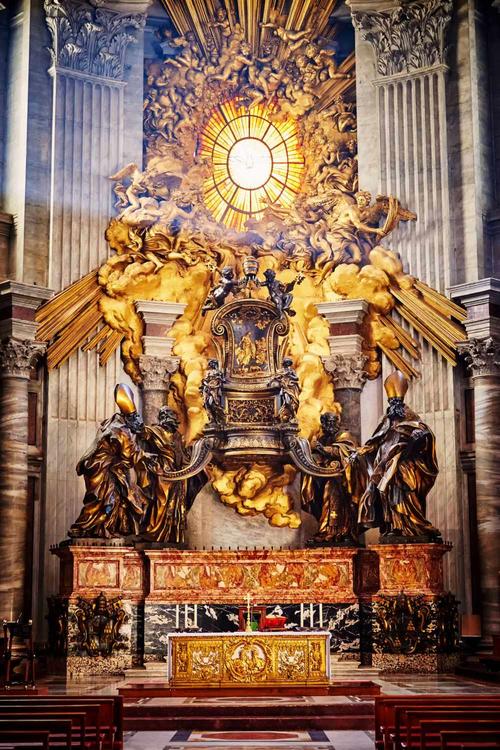
Yes I know I misspelled confusion. There is much confusion today, and many have the wrong attitude. So let us go into Sacred Scripture for some advice. Many believe that Matthew 24; Mark 13; and Luke 21 apply to our times, so we will spend our time mainly here.
And because iniquity hath abounded, the charity of many shall grow cold. (Matthew 24:12)
No, this does not give us a license to allow our charity to grow cold. Instead we should take this as a warning to make sure we are being charitable. It is strongly recommended to read the thirteenth chapter of first Corinthians. Saint Alphonsus also wrote on this, and this is in print as Charity: A Commentary on 1 Corinthians 13.
In these time some become agitated and lose charity. How many are calling each other heretics and schismatics? Is this charitable. A century ago things were clear, but today the waters have been muddied by The Enemy, Satan. Agitation is not from God, peace is. And so let us consider that everyone is making an honest attempt to do God's will.
Also some wish to get into debates over these matters. This is not a time for debate, but for prayer.
We should be ready to answer honest inquiries and explain why we have done what we have done. Almost three and a half decades ago I did just this. I had reached a conclusion and thought I should inform my friends. I explained the decision I had reached and why I had reached it and asked for their input.
Note the letter is published here: 1983 Letter
Having seen some of these debates, one wonders is debating is from the devil.
Then if any man shall say to you: Lo here is Christ, or there, do not believe him. For there shall arise false Christs and false prophets, and shall shew great signs and wonders, insomuch as to deceive (if possible) even the elect. (Matthew 24:23-24)
And then if any man shall say to you, Lo, here is Christ; lo, he is here: do not believe. For there will rise up false Christs and false prophets, and they shall shew signs and wonders, to seduce (if it were possible) even the elect. (Mark 13:21-22)
Consider what type of confusion would have to be introduced that even the elect could be deceived. Is this not what we see today?
Let us consider the following verses:
For there shall be then great tribulation, such as hath not been from the beginning of the world until now, neither shall be. And unless those days had been shortened, no flesh should be saved: but for the sake of the elect those days shall be shortened. (Matthew 24:21-22)
For in those days shall be such tribulations, as were not from the beginning of the creation which God created until now, neither shall be. And unless the Lord had shortened the days, no flesh should be saved: but for the sake of the elect which he hath chosen, he hath shortened the days. (Mark 13:19-20)
What Jesus is telling us is that this is the worst time ever. Let us consider another time of confusion, the Western Schism, which is in some ways a precedent case for our own times. It began with the Cardinals departing from the man they had elected as Pope and proceeding to declare the election null and electing another man as Pope. Suddenly two men claimed to be Pope and the Bishops started taking sides. After thirty years many became disgusted with the confusion. The Cardinals from both Popes left their man and called a Council at Pisa to attempt to end the Western Schism. Instead they simply added to the confusion with the election of a third man. Now we have three men claiming to be Pope. Finally the Council of Constance was convened and the Western Schism was ended.
The important point is that although technically a half to two thirds of the Church was in schism for following a false claimant to the Papacy, no one was truly considered to a schismatic. The reason is simple, all Catholics wanted to follow the Vicar of Christ. Their problem is figuring out who that was.
Saint Antoninus reports of that time: “Although it is necessary to believe that there is but one supreme head of the Church, nevertheless, if it happens that two Popes are created at the same time, it is not necessary for the people to believe that this one or that one is the legitimate Pontiff; they must believe that he alone is the true Pope who has been regularly elected, and they are not bound to discern who that one is; as to that point, they may be guided by the conduct and opinion of their particular pastor.”
Should we not be equally as indulgent in this time of even greater confusion?
When therefore you shall see the abomination of desolation, which was spoken of by Daniel the prophet, standing in the holy place: he that readeth let him understand.
(Matthew 24:15)
And when you shall see the abomination of desolation, standing where it ought not: he that readeth let him understand: (Mark 13:14)
Let us not try and figure out the abomination of desolation. Rather let us read and understand those things that will lead us to be true Christians. Sacred Scripture should have a prominent place, which is why we are searching the Scriptures today. (John 5:37; John 7:52)
And Jesus answering, said to them: Take heed that no man seduce you: For many will come in my name saying, I am Christ: and they will seduce many. (Matthew 24:4-5)
And Jesus answering, began to say to them, Take heed lest any man deceive you. (Mark 13:5)
Who said: Take heed you be not seduced; for many will come in my name, saying, I am he; and the time is at hand: go ye not therefore after them. (Luke 21:8)
This is why we take and read. We especially study the Catechism along side Sacred Scripture. We should fortify ourselves with the truths of the Faith. Our main focus should be to become saints. Unfortunately some spend much of their time in either trying to sort things out or what is worse, trying to convince the world that they are right. If we all aim at sanctifying ourselves, God will intervene and He will straighten things out. We cannot do it without Him.
Watch ye therefore, because ye know not what hour your Lord will come. (Matthew 24:42)
Watch ye therefore, (for you know not when the lord of the house cometh: at even, or at midnight, or at the cockcrowing, or in the morning,) Lest coming on a sudden, he find you sleeping. And what I say to you, I say to all: Watch. (Mark 13:35-7)
Watch ye, therefore, praying at all times, that you may be accounted worthy to escape all these things that are to come, and to stand before the Son of man. (Luke 21:36)
We should always be watching, because we do not know the day nor the hour.
Someday we will die and have to make an accounting of our lives. Let us then live so as to be always ready to die and go straight to heaven. Yes, we are ALL called to be saints. And this is the most important point.
And take heed to yourselves, lest perhaps your hearts be overcharged with surfeiting and drunkenness, and the cares of this life, and that day come upon you suddenly. For as a snare shall it come upon all that sit upon the face of the whole earth. (Luke 21:34-35)
Surfeiting means to be over filled, such as by gluttony. And how many of us are gluttons? How many of us are overzealous about the care of our life that we forget the cares of our soul. “The days of our years in them are threescore and ten years.” (Psalms 89:10) And yet, we devote most of these seventy or so years to the cares of our life, when our soul will last for eternity.
In your patience you shall possess your souls. (Luke 21:19)
Here is the patience and the faith of the saints. (Apocalypse 13:10)
Here is the patience of the saints, who keep the commandments of God, and the faith of Jesus. And I heard a voice from heaven, saying to me: Write: Blessed are the dead, who die in the Lord. From henceforth now, saith the Spirit, that they may rest from their labours; for their works follow them. (Apocalypse 14:12-13)
Patience is a most necessary virtue in these days.
Wait on God with patience: join thyself to God, and endure, that thy life may be increased in the latter end. (Ecclesiasticus 2:3)
These are times that try our patience, but let us ask God to help us remain patient in this adversity.
And because iniquity hath abounded, the charity of many shall grow cold. But he that shall persevere to the end, he shall be saved. (Matthew 24:12-13)
We need to persevere in charity to the end.
God is charity: and he that abideth in charity, abideth in God, and God in him. (I John 4:16)
This is a good time to read the thirteenth chapter of first Corinthians and take these words to hear.
These are troubling times. Let us not get distracted like Martha did, but choose the best part like Mary did. (Luke 10:38-42)
And the Lord answering, said to her: Martha, Martha, thou art careful, and art troubled about many things: But one thing is necessary. Mary hath chosen the best part, which shall not be taken away from her. (Luke 10)

New Videos from our YouTube Channels

What Would Jesus Do?
Oldies But Goodies!
Fasting
Processions and the Greater Litanies
Pride and the Great Apostasy

Living Catholic: Abnormal Social Developments That Leads To Rebellion
Here are some visible symptoms:
-
Communication break down- silent at the dinner table, etc.
This is a symptom of a crushed spirit. A crushed spirit is injury to any area of our soul or spirit faculties - mind, emotions and will. It is injury to the unseen areas of our being.
Looking diligently, lest any man be wanting to the grace of God; lest any root of bitterness springing up do hinder, and by it many be defiled.(Hebrews 12:15)
A joyful mind maketh age flourishing: a sorrowful spirit drieth up the bones. (Proverbs 17:22)
The spirit of a man upholdeth his infirmity: but a spirit that is easily angered, who can bear? (Proverbs 18:14)
Both the easily angered spirit and the sorrowful spirit are in other words a crushed spirit.
-
Ungratefulness- They weigh the benefits his parents provide against their offenses.
Ungratefulness is a sign that the rebel has alienated there affections.
J. Edgar Hoover observed that one of the Chief characteristics of a juvenile delinquent is the attitude that society owes him a living.
-
Stubbornness- Rebels do not follow through on orders.
Stubbornness is a sign that the rebel is rejecting Authority.
Because it is like the sin of witchcraft, to rebel: and like the crime of idolatry, to refuse to obey. (I Kings 15:23)
-
Open Rebellion-They Desire an equal voice with the parents.
They establish themselves as their own Authority. The basis of Satan's rebellion and downfall was his desire to be on an equal level with God.
-
Wrong Friends- Rebels are drawn to wrong friends.
When the rebellious person is looking for others they are compatible with, they look for those who are rebellious.
Some characteristics of wrongs friends are:
- They serve fleshly appetites.
- Find humor in there shame.
- Have no concern for eternity.
Whose end is destruction; whose God is their belly; and whose glory is in their shame; who mind earthly things.(Philippians 3:19)
-
Defense of Sensuality- self authority produces relative standards
The rebel makes excuses for why he can or why he wants to fulfill his' or hers sensual desires.
Now the works of the flesh are manifest, which are fornication, uncleanness, immodesty, luxury, Idolatry, witchcrafts, enmities, contentions, emulations, wraths, quarrels, dissensions, sects, Envies, murders, drunkenness, revellings, and such like. Of the which I foretell you, as I have foretold to you, that they who do such things shall not obtain the kingdom of God. (Galatians 5:19-21)
-
Condemnation of others-They are focusing on the hypocrites.
When a rebel does this, they are showing signs of a deep sense of guilt.
For wherein thou judgest another, thou condemnest thyself. For thou dost the same things which thou judgest.(Romans 2:1)
-
A lack of seriousness and fits of depression.
They tend to joke about everything and have thoughts of suicide.
Four types of suicide:
- Mental
- Moral
- Spiritual
- Physical
Laughter shall be mingled with sorrow, and mourning taketh hold of the end of joy. (Proverbs 14:13)
Job dealt with thoughts of suicide.
My soul is weary of my life, I will let go my speech against myself, I will speak in the bitterness of my soul.(Job 10:1)

Sanctifying Grace
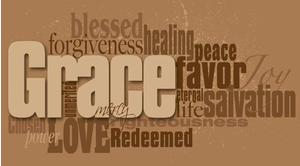
Last month I started a short series on Grace. The meaning of grace and the two kinds of grace.
As a review: The definition we gave for Grace was this:
Grace is a supernatural gift of God bestowed on us through the merits of Jesus Christ for our salvation.
We also briefly discussed the fact that there are two kinds of grace.
1. Sanctifying Grace
2. Actual Grace
Neither of which are specifically named in scriptures. But the scriptures do testify of the two graces and there differences. For those who would deny that there are not two kinds because the scripture never names them should also know that the word Trinity is not mentioned in the scriptures either. Nor is the word Rapture, even though as Catholics we believe the bible tells us of a time at the end of the ages when we as the Church will be taken up to meet Christ in the clouds. (thats a whole different subject.)
Let's start with Sanctifying Grace:
Sanctifying Grace is that grace that confers on our souls a new life that is, a sharing in the life of God Himself.
Jesus answered: Amen, amen I say to thee, unless a man be born again of water and the Holy Ghost, he cannot enter into the kingdom of God. (John 3:5)
In order to enter into the kingdom of God, a man must be born again; this is accomplished through baptism, which confers on our souls a new life, a sharing in the life of God Himself. In other words-Sanctifying Grace.
This life..this eternal life is not a life separated from God it is a sharing in the life of God Himself.
Let me illustrate:
Behind almost every home is a current of electricity. Now an electric lamp will not work until it is plugged into the socket on the wall. Once that is done, the flow of electricity will also flow through the cord of the lamp and it will light up!
The same is with Eternal life. Gods life is eternal. no beginning and no end. If we want to have a life in Him we must be plugged into the socket so that His life will flow through us. that is what it means when we say that Sanctifying grace confers on our souls a new life...a sharing in the life of God Himself.
Now Let's look at the the story of Nicodemus in more detail:
What is the part of water in the new birth? Some try to explain the water out of the new birth by saying it is a figure of the Holy Spirit. But this doesn't fit. This would make Jesus' statement in John 3:5 nonsense, "unless a man be born again of water (the Holy Ghost) and the Holy Ghost, he cannot enter into the kingdom of God" Others contend "water" refers to our first, physical birth and "the Spirit" refers to the new birth. But Jesus is explaining the method of the new birth here. I hardly see why He would need to say one must be born physically, i.e., be a person, before he can be born again. Further, Jesus used the term "blood" to symbolize the first, physical birth in John 1:12-13, not "water."
Who are born, not of blood, nor of the will of the flesh, nor of the will of man, but of God. (John 1:13)
When one minister was asked, "What is the 'water' of the new birth?", he replied, "Buttermilk!" When the shocked inquirer asked why he believed this, the minister answered, "If it's not water, you might as well make it anything you want."
With what element of the gospel is water connected?
Then Peter answered: Can any man forbid water, that these should not be baptized, who have received the Holy Ghost, as well as we? And he commanded them to be baptized in the name of the Lord Jesus Christ. Then they desired him to tarry with them some days. (Acts 10:46-48).
Water is essential to baptism "in the name of the Father and of the Son and of the Holy Ghost" (Matthew 28:19)
Not by the works of justice, which we have done, but according to his mercy, he saved us, by the laver of regeneration, and renovation of the Holy Ghost; (Titus 3:5)
The Laver - the sacred wash-bowl of the tabernacle and temple ( Exodus 30:18 Exodus 30:28 ; 31:9 ; 35:16 ; 38:8 ; 39:39 ; Exodus 40:7 Exodus 40:11 Exodus 40:30 , etc.), a basin for the water used by the priests in their ablutions.
Of regeneration- the word comes from two greek words: pálin, "again" and génesis, "birth, beginning" in other words a new beginning..a new birth....being born again.
When we are washed in water, we are born anew.
Not only does Sanctifying Grace bring about a new birth through the baptism waters but it also brings about the new birth through the Holy Ghost
Unless a man be born again of water and the Holy Ghost, he cannot enter into the kingdom of God. (John 3:5)
But what is the part of "the Spirit" in our regeneration, that is in our new birth?
When the Holy Spirit leads us through the gospel to believe in Christ and be baptized in water, we are born again and become sons of God in Christ.
For you are all the children of God by faith, in Christ Jesus. For as many of you as have been baptized in Christ, have put on Christ. (Galatians 3:26-27).
As the results of this sanctifying Grace, we become new creations in Christ.
If then any be in Christ he is a new creature, the old things are passed away, behold all things are made new. (2 Corinthians 5:17)
We become citizens of a spiritual kingdom.
But our conversation (our life, our citizenship) is in heaven; from whence also we look for the Saviour, our Lord Jesus Christ. (Philippians 3:20)
We become the sons and heirs of God
For you are all the children of God by faith, in Christ Jesus. For as many of you as have been baptized in Christ, have put on Christ. (Galatians 3:26-27)
For the Spirit himself giveth testimony to our spirit, that we are the sons of God. And if sons, heirs also; heirs indeed of God, and joint heirs with Christ: yet so, if we suffer with him, that we may be also glorified with him. (Romans 8:16-17).
Our inheritance is the "incorruptible and undefiled" home in heaven
Blessed be the God and Father of our Lord Jesus Christ, who according to his great mercy hath regenerated us unto a lively hope, by the resurrection of Jesus Christ from the dead, Unto an inheritance incorruptible, and undefiled, and that can not fade, reserved in heaven for you, Who, by the power of God, are kept by faith unto salvation, ready to be revealed in the last time. (1 Peter 1:3-5).
We are made holy and pleasing to God
Paul, an apostle of Jesus Christ, by the will of God, to all the saints who are at Ephesus, and to the faithful in Christ Jesus. Grace be to you, and peace from God the Father, and from the Lord Jesus Christ. Blessed be the God and Father of our Lord Jesus Christ, who hath blessed us with spiritual blessings in heavenly places, in Christ: As he chose us in him before the foundation of the world, that we should be holy and unspotted in his sight in charity. (Ephesians 1:1-9)
We are made temples of the Holy Ghost
Or know you not, that your members are the temple of the Holy Ghost, who is in you, whom you have from God; and you are not your own? (I Corinthians 6:19)
In Conclusion
"unless a man be born again, he cannot see the kingdom of God" (John 3:3).
"unless a man be born again of water and the Holy Ghost, he cannot enter into the kingdom of God." (John 3:5)
"you must be born again." (John 3:7)
Through the baptismal waters and the regeneration of our hearts by the Holy Spirit we become "born again", a "new creature" in Christ Jesus, "adopted sons of God". This is what Sanctifying grace is all about.


Commentary on the Book of Psalms
By Saint Robert Bellarmine
$24.95 SALE PRICE!! $22.95

The print of this edition is 12 point, larger than an earlier edition in print. In these days the Psalms are little used in the private devotions of lay Catholics; and forms of prayer, which have no authoritative sanction, and which are often little recommendable, either for sentiment or expression, are used, instead of those which have been dictated by the Holy Ghost. The reason of this notable change in the practice of the faithful must be that they do not understand the Psalms. This work was prepared for the use of the laity, but clergy and religious will find it very useful in understanding the psalms they pray in the Divine Office.
$14.95
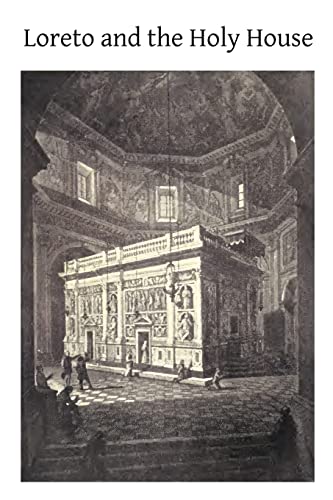
In reply to a petition made to him by the Bishops of the Province of Piceno, in which Loreto stands, our Holy Father Pope Benedict XV. has issued a Decree, dated April 12, 1916, ordering the Feast of the Translation of the Holy House to be henceforth observed each year, on the loth of December, in all the Dioceses and Religious Congregations of Italy and the adjacent isles. Moreover, by the same Decree he grants permission for the extending of the festival to all other Dioceses and Religious Congregations, on its being applied for by the Ordinaries. The Pontiff expressly grounds the granting of this favour on the acknowledged pre-eminence of the Loreto Sanctuary, it being. as the preamble states. II the House itself-translated from Palestine by the ministry of Angels-in which was born the Blessed Virgin Mary, and in which the Word was made flesh."
Jesus Christ the Word Incarnate

Considerations gathered from the Works of the Angelic Doctor St. Thomas Aquinas The title itself of this book, intelligent and devout reader, gives you to understand the matter treated of, the source from which it is taken, in what manner and to what end it is proposed. The matter is Jesus Christ, not viewed however in every respect, but simply as the Word Incarnate. If it shall please God to grant us life, time and sufficient strength, we shall endeavor to offer you some time other considerations, drawn from the same pure sources of the angelic doctor, which regard Jesus Christ in his sacraments, especially in the Eucharist and in his Sacred Heart. But for this time we confine ourselves to consider him only as the Word of God, and the Word Incarnate, that is, we limit ourselves to that matter which is dealt with by St. Thomas in his summa theologica, both in the first part where he treats of the Person of the Word, and in the third part where he treats of the Incarnation. With this we have now indicated from what source the whole matter of the present volume is taken. It is taken from the works of the angelic doctor St. Thomas, chiefly from the summa theologica, but sometimes also from his other works, according as suited the various subjects which we had to explain. This will give you the reason why we omitted several points, by treating which we would have been able to render our labor more complete. We have omitted them, because they were not found in St. Thomas. For it was our intention in writing these pages, to confine ourselves, in explaining them, to the doctrine of St. Thomas and no other.

The Fraters Kitchen

Watermelon Sherbet
You can turn fresh watermelon and vanilla yogurt into a creamy and tangy sherbet in just two hours.
2-Ingredient Watermelon Sherbet 2-Ingredient Watermelon Sherbet is a light, refreshing frozen treat that comes together with just fruit and yogurt, the perfect healthy snack or dessert for cooling down all summer long!
Ingredients
3 cups seedless watermelon cubes,
cut 1 inch in size and frozen solid 1/2 cup vanilla yogurt
Instructions
1. Add half of the frozen watermelon cubes to a large food processor. Process until the watermelon breaks down and becomes grainy. Stop the food processor and add half of the yogurt. Process until the mixture becomes smooth and creamy, scraping down the sides of the bowl as necessary. Scoop the sherbet into a separate container and repeat steps with the remaining ingredients.
2. Serve immediately for a frozen yogurt/soft-serve consistency. For a firmer consistency, freeze for 1 to 2 hours and then scoop. Leftovers may be frozen solid, but the sherbet will be very hard and impossible to scoop straight out of the freezer. Instead, place the container of frozen sherbet in the refrigerator to slowly soften for 3 hours before serving, at which point it should be scoopable.
Notes
A small (personal-sized) seedless watermelon will yield around 7 cups of watermelon cubes, enough for at least two batches of this recipe. I try to remove as many small seeds as possible while cutting my watermelon into cubes so that the seeds don't end up in the sherbet.
To freeze the watermelon cubes, place them in a single layer on a rimmed baking sheet and place in the freezer for at least 4 hours but preferably overnight. Make sure there's not excess watermelon juice on the pan or the cubes will freeze into a solid mass. I also prefer freezing the cubes on top of a piece of foil or parchment paper which makes it easier to release them from the pan later.
When making this sherbet, be sure to work quickly or the watermelon will start to thaw and the sherbet may become watery.
http://www.fivehearthome.com/2016/08/08/2-ingredient-watermelon-sherbet/


-
Pray for Deacon Francis Dominic as he teaches Catechism through the web site. We are also working on a plan to bring classes to the people in their homes around the United States. We are working on a new Website where we desire to have a site that people can listen or watch Catechism lessons, take tests, and get a certificate of completion. It will take a long time to finish it but you can see the work that we are doing and we will keep you updated on when it is completed. Check out all of the construction going on over there at Traditional Catechism.com
-
Francis Dominic was ordained Deacon August 1st In Centralia Illinois. We had priest, and Bishops, as well as his own family members and friends that was there for the celebration! Here are some pictures of the Ordination.



- Deacon Francis has some material needs of his own. He is in need of three Cassocks.
-
We are looking to buy land for a Church and a House of Prayer. Please pray with us in finding the right place. and if you feel led, to donate money for this project you can donate by Paypal, or make check or money orders out to Vatican in Exile.
-
We have been looking at Hermitages to put on the property we will eventually buy. The ones we have been looking at are perfect for what we want. Although we are not in the market for them as of yet, we are still wanting to have a plan.
- Pray that God will open doors for an assignment for Deacon Francis Dominic's as well as the money needed to support him.
Every month we are very close with our budget. It takes money to be available to people in other areas as well as having supplies like rosaries, bibles, pamphlets, Catechisms etc. for sharing with Non Catholics. At this time, to stay comfortably out of the red we need 300.00 a month. Please read the message Giving to God's Work and then decide how you can give. Everyone should give something. It does not have to be much.

Saint Christopher and Saint Michael the Archangel two prominent Patron Saints
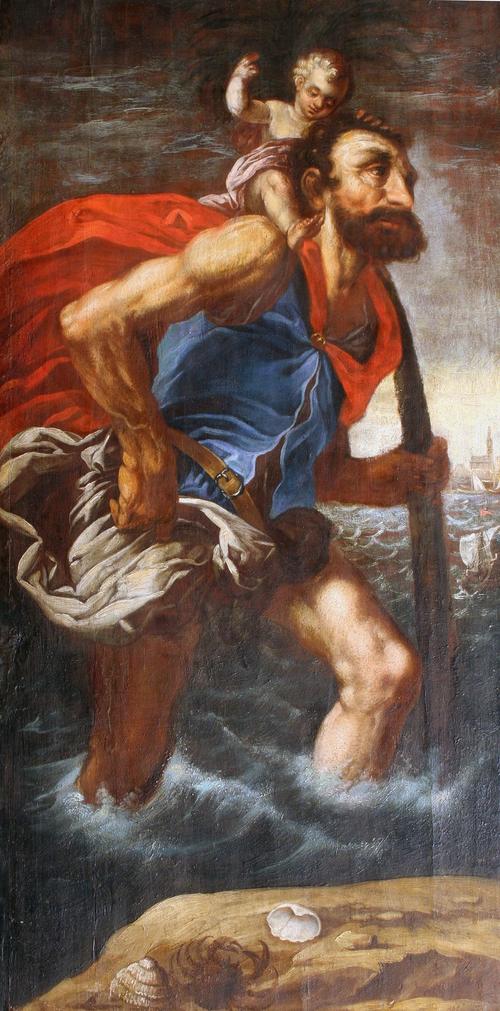
Saint Christopher and Saint Michael the Archangel are one of the many very ancient mythical Saints who are still venerated in various Christian Denominations from the Anglo Catholic tradition to the Roman Church and the Eastern Orthodox Church and are represented in Iconography one of the oldest ways of expressing the veneration of Saints and also a reminder of God's graces in heaven and earth.
From old traditions, Christians did have deep veneration for Saints and Angels and even in the Bible Angels intercede for the living.
Saint Christopher is a saint, indeed listed as a martyr. He apparently died under the Roman Emperor Decius, in 251 AD. Other than his listing as a martyr, there are no primary sources referring to St. Christopher, only stories and traditions which have been passed down.
According to these accounts, St. Christopher was extremely tall, and by some accounts he was even a giant! He was surely a man of significant physical stature. But, more importantly, he was a spiritual giant and a sure model and inspiration for the Christian faithful.
Christopher decided one day that he wanted to serve the greatest king he could. He presented himself before his local ruler and entered service, until he noticed the king cross himself at the mention of the devil, revealing that the king believed the Devil to have more power.
St. Christopher then decided to serve the Devil. During his search, he encountered a band of thieves, whose leader referred to himself as the Devil. But when this leader avoided a Christian cross out of fear, St. Christopher learned there was someone even more powerful than the Devil.
St. Christopher found a hermit who taught him all about Christ, the King of Kings. The hermit suggested that he spend his life in prayer and fasting, a thing which St. Christopher, a large and probably often hungry man found difficult, he objected. The hermit suggested he then find something else that would please Christ. St. Christopher offered to work at a nearby river, and help travelers across. The hermit advised St. Christopher this would please Christ. The fording was dangerous and many people with less strength had drowned.
One day, a child approached St. Christopher by the river and asked to be helped across. St. Christopher obliged. However, as he entered midstream, the river rose and the child's weight grew and became extremely heavy. It was only by great exertion that St. Christopher safely delivered the child to the other side.
When St. Christopher asked the child why he was so heavy, the child explained that He was the Christ and when St. Christopher carried Him, he also carried the weight of the whole world on his shoulders. The child then vanished.
Other legends state that St. Christopher traveled after this experience and evangelized thousands of people. Arriving in Lycia in Asia Minor, and witnessing to Christians there who were being martyred. At that time, St. Christopher was detained and ordered to offer a sacrifice to the emperor. When he refused, it was decided to attempt to persuade him with money and women. Two women were sent to seduce him, but instead he converted them to Christianity.
After this, it was decided to have him killed, but various attempts to assassinate him failed. Eventually, he was arrested and beheaded.
The name "Christopher" means Christ-bearer, and may allude to the legend of the man carrying the Christ Child across the river.
Saint Christopher also did not become popularized in the Church until the 7th century, about three centuries after his death. We know of his popularity because around the 7th century, churches and monasteries began to be named after him.
There has been speculation that St. Christopher could have also been confused with St. Menas, an Egyptian saint. Both Christopher and Menas are referred to as "Christ bearers" and are patrons of travelers.
St. Christopher is the patron saint of travelers and of children. His feast day is July 25. Because he is not officially recognized by the Church, he has no date of beatification or canonization. Despite these technicalities, it is widely thought that he was real and that he continues to intercede on behalf of Christians, especially children, today.
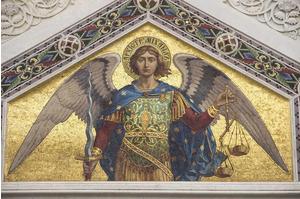
Saint Michael the Archangel isn't a saint, but rather he is an angel, and the leader of all angels and of the army of God.
This is what the title "Archangel" means, that he is above all the others in rank.
St. Michael has four main responsibilities or offices, as we know from scripture and Christian tradition.
- The first is to combat Satan.
- The second is to escort the faithful to heaven at their hour of death.
- The third is to be a champion of all Christians, and the Church itself.
- And the fourth is to call men from life on Earth to their heavenly judgment.
Very little is known about St Michael other than what we know from scriptures, which themselves are sparse.
In Daniel, St. Michael is mentioned twice. The first time as one who helped Daniel, and the second time he is mentioned with regard to the end times of the world when he will stand for the "children of thy people."
His next mention comes in the Epistle of St. Jude, where St. Michael is said to guard the tombs of Moses has contended with Satan over the body of Moses.
According to the "Revelation of Moses", he also guards the body of Eve.
The final mention is in Revelation, where St. Michael and his angels, do battle with the dragon.
There are other scriptures where St. Michael is implied, but not mentioned by name, such as the angel; who defends the gate to Paradise, who defends against Balaam, and "who routed the army of Sennacherib."
Today, St. Michael is invoked for protection, especially from lethal enemies. He is also the patron of soldiers, police and doctors.
The Faithful wear or carry medals, plaques or small depictions of the Saint and Archangel as a token. I advise all Christians to have a medal of Saint Christopher and the Archangel Michael at hand with the Saint Benedict Crucifix in their collection.
I also advise to pray to Saint Michael the Archangel and Saint Christopher on a daily basis.
Saint Michael and Saint Christopher Pray for us!


To Donate online go to:
Donations

To Donate by Mail:
Our address is
Vatican in Exile
829 NE Chester
Topeka, Kansas 66616
Make Checks payable to:
Vatican in Exile



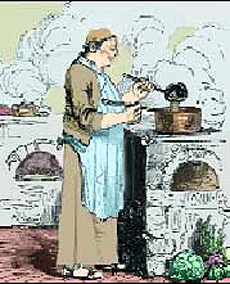



 Follow
Follow


